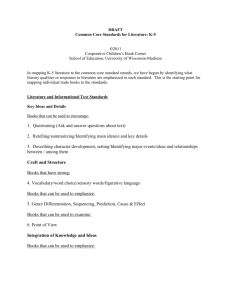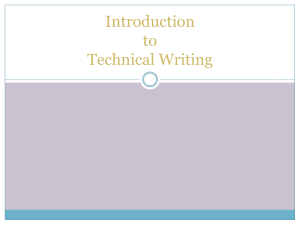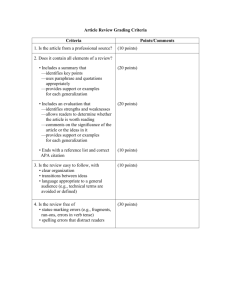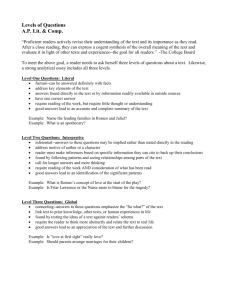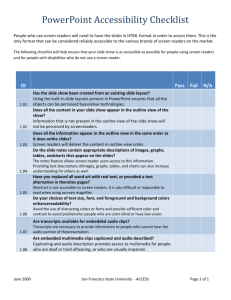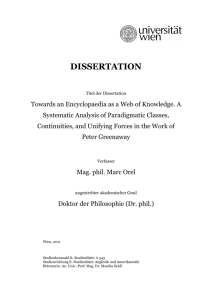FEATURE| - Intellect
advertisement
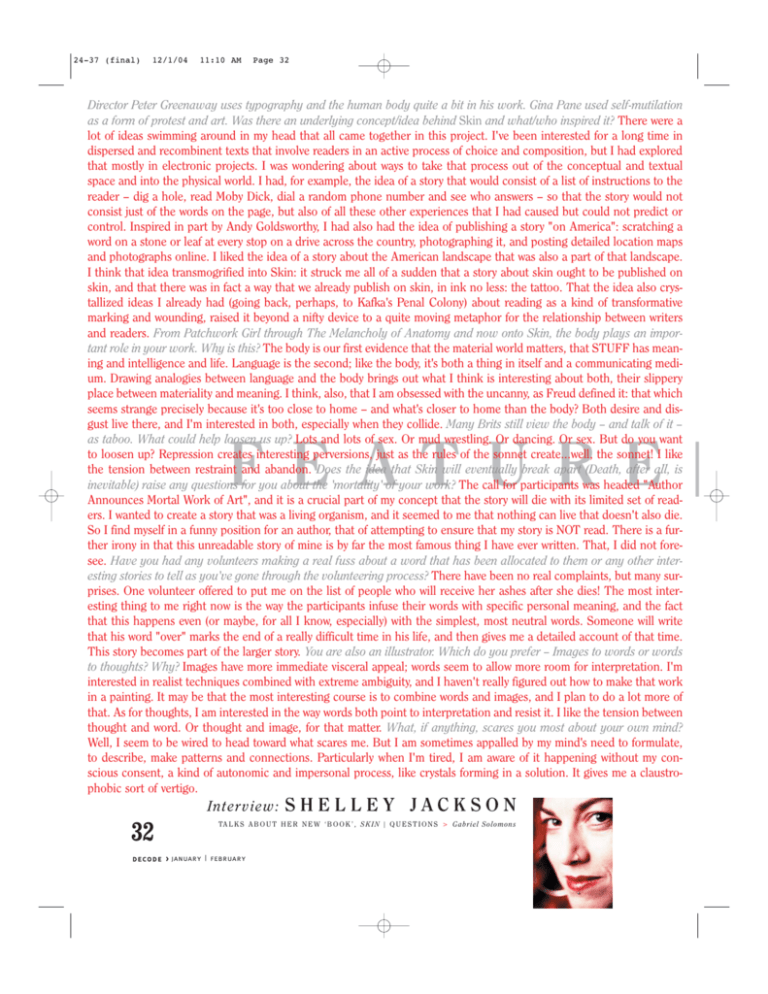
24-37 (final) 12/1/04 11:10 AM Page 32 Director Peter Greenaway uses typography and the human body quite a bit in his work. Gina Pane used self-mutilation as a form of protest and art. Was there an underlying concept/idea behind Skin and what/who inspired it? There were a lot of ideas swimming around in my head that all came together in this project. I've been interested for a long time in dispersed and recombinent texts that involve readers in an active process of choice and composition, but I had explored that mostly in electronic projects. I was wondering about ways to take that process out of the conceptual and textual space and into the physical world. I had, for example, the idea of a story that would consist of a list of instructions to the reader – dig a hole, read Moby Dick, dial a random phone number and see who answers – so that the story would not consist just of the words on the page, but also of all these other experiences that I had caused but could not predict or control. Inspired in part by Andy Goldsworthy, I had also had the idea of publishing a story "on America": scratching a word on a stone or leaf at every stop on a drive across the country, photographing it, and posting detailed location maps and photographs online. I liked the idea of a story about the American landscape that was also a part of that landscape. I think that idea transmogrified into Skin: it struck me all of a sudden that a story about skin ought to be published on skin, and that there was in fact a way that we already publish on skin, in ink no less: the tattoo. That the idea also crystallized ideas I already had (going back, perhaps, to Kafka's Penal Colony) about reading as a kind of transformative marking and wounding, raised it beyond a nifty device to a quite moving metaphor for the relationship between writers and readers. From Patchwork Girl through The Melancholy of Anatomy and now onto Skin, the body plays an important role in your work. Why is this? The body is our first evidence that the material world matters, that STUFF has meaning and intelligence and life. Language is the second; like the body, it's both a thing in itself and a communicating medium. Drawing analogies between language and the body brings out what I think is interesting about both, their slippery place between materiality and meaning. I think, also, that I am obsessed with the uncanny, as Freud defined it: that which seems strange precisely because it's too close to home – and what's closer to home than the body? Both desire and disgust live there, and I'm interested in both, especially when they collide. Many Brits still view the body – and talk of it – as taboo. What could help loosen us up? Lots and lots of sex. Or mud wrestling. Or dancing. Or sex. But do you want to loosen up? Repression creates interesting perversions, just as the rules of the sonnet create...well, the sonnet! I like the tension between restraint and abandon. Does the idea that Skin will eventually break apart (Death, after all, is inevitable) raise any questions for you about the 'mortality' of your work? The call for participants was headed "Author Announces Mortal Work of Art", and it is a crucial part of my concept that the story will die with its limited set of readers. I wanted to create a story that was a living organism, and it seemed to me that nothing can live that doesn't also die. So I find myself in a funny position for an author, that of attempting to ensure that my story is NOT read. There is a further irony in that this unreadable story of mine is by far the most famous thing I have ever written. That, I did not foresee. Have you had any volunteers making a real fuss about a word that has been allocated to them or any other interesting stories to tell as you've gone through the volunteering process? There have been no real complaints, but many surprises. One volunteer offered to put me on the list of people who will receive her ashes after she dies! The most interesting thing to me right now is the way the participants infuse their words with specific personal meaning, and the fact that this happens even (or maybe, for all I know, especially) with the simplest, most neutral words. Someone will write that his word "over" marks the end of a really difficult time in his life, and then gives me a detailed account of that time. This story becomes part of the larger story. You are also an illustrator. Which do you prefer – Images to words or words to thoughts? Why? Images have more immediate visceral appeal; words seem to allow more room for interpretation. I'm interested in realist techniques combined with extreme ambiguity, and I haven't really figured out how to make that work in a painting. It may be that the most interesting course is to combine words and images, and I plan to do a lot more of that. As for thoughts, I am interested in the way words both point to interpretation and resist it. I like the tension between thought and word. Or thought and image, for that matter. What, if anything, scares you most about your own mind? Well, I seem to be wired to head toward what scares me. But I am sometimes appalled by my mind's need to formulate, to describe, make patterns and connections. Particularly when I'm tired, I am aware of it happening without my conscious consent, a kind of autonomic and impersonal process, like crystals forming in a solution. It gives me a claustrophobic sort of vertigo. F E AT U R E | Interview: 32 SHELLEY JACKSON TA L K S A B O U T H E R N E W ‘ B O O K ’ , S K I N | Q U E S T I O N S > Gabriel Solomons d e c o d e > january | february


